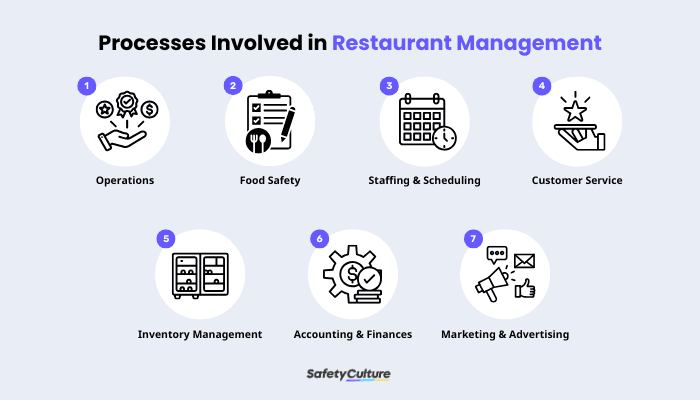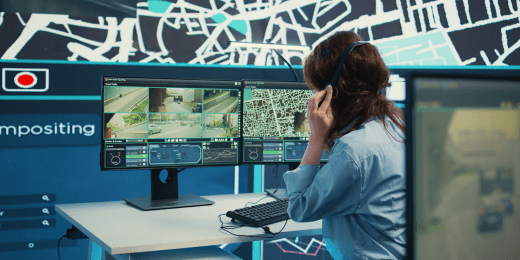The Ultimate Guide to Restaurant Management
Discover the essential skills and strategies for effective restaurant management in this comprehensive guide.

Published 3 Mar 2025
Article by
6 min read
What is Restaurant Management?
Restaurant management involves overseeing a restaurant’s operations and activities to ensure its success and profitability. It includes managing staff, handling customer service, maintaining quality control, overseeing inventory and supply chain logistics, and implementing marketing strategies to attract and retain customers.
Additionally, other responsibilities include budgeting, financial reporting, and compliance with health and safety regulations. Effective restaurant management requires strong leadership skills, attention to detail, and the ability to adapt to changing market trends while fostering a positive work environment for employees and delivering an exceptional dining experience for guests.
Processes Involved in Restaurant Management
Restaurant management involves various processes that work together to ensure the smooth operation of a restaurant. These processes include:

Processes Involved in Restaurant Management
Operations: Oversee daily activities to ensure seamless restaurant functionality. It includes managing workflows, maintaining ambiance, and enforcing policies.
Food Safety and Hygiene: Implement and monitor food safety protocols to ensure compliance with health regulations. Regular sanitation checks and staff training are crucial to maintaining high hygiene standards .
Staffing and Scheduling: Recruit, train, and retain a capable team to provide excellent service. Develop and manage schedules to meet staffing needs while balancing labor costs .
Customer Service: Deliver exceptional experiences to guests by addressing their needs promptly. Handle customer feedback to foster loyalty and improve service quality.
Inventory Management: Track food and supply levels to prevent shortages or overstocking. Implement efficient systems to reduce waste and control costs.
Accounting and Finances: Monitor budgets and manage expenses to maintain profitability. Track financial performance through accurate record-keeping and reporting.
Marketing and Advertising: Promote your restaurant to reach target audiences and drive foot traffic. Use social media, partnerships, and campaigns to build brand awareness.
Common Challenges in Managing Restaurants
Managing restaurants is not a walk in the park. Restaurant managers face unique challenges that require strategic thinking and problem-solving skills to overcome.
Here are some common challenges faced by restaurant managers:
Challenge 1: Resistance to Change
Many restaurant managers cling to outdated methods like pen and paper or spreadsheets for scheduling, thinking, “If it works, it’s good enough.” While these tools may seem adequate, they often lead to inefficiencies, time-consuming processes, and limited access to key business insights like labor and sales reports.
Adopting modern solutions such as restaurant management software can streamline operations, save time, and boost productivity, ensuring your restaurant remains competitive and avoids falling into inefficient practices.
Challenge 2: Compliance Issues
Restaurant managers can find it challenging to keep up with changing regulations and industry standards. In Europe, 25% of hospitality businesses face penalties due to food safety compliance issues. Failing to address these concerns, including maintaining a strong food hygiene rating, can result in hefty fines and reputational damage.
Investing in digital checklists and automated compliance tracking tools can help restaurant managers stay informed about regulations and prioritize safe food handling practices, which are critical to avoiding costly noncompliance.
Challenge 3: Underutilization of Data
Failing to leverage data for decision-making in the competitive restaurant industry can result in inefficiencies and missed opportunities. Integrated systems that track sales, labor, restaurant inventory management, and customer behavior provide actionable insights that improve operations and profitability.
By optimizing food handling to reduce waste and replacing low-margin menu items with profitable ones, managers can enhance efficiency and capitalize on data-driven strategies to grow their business.
Challenge 4: Staffing Challenges
Staff turnover remains a persistent issue, with 64% of UK hospitality businesses struggling to hire qualified employees. It leads to lower service levels and customer dissatisfaction. High turnover rates increase recruiting costs and time spent on onboarding and restaurant management training while also affecting staff productivity and morale.
Creating a supportive work culture, offering growth opportunities, and focusing on food handling and customer service training can reduce turnover and maintain a well-functioning team that supports long-term success.
Best Practices in Restaurant Management
To overcome the challenges discussed above, implementing these best practices can help restaurant managers stay ahead of the game:
Establish a Clear Mission and Business Plan
Start by defining your restaurant’s mission, vision, and target audience. A detailed business plan outlining your objectives, strategies, and financial projections will guide your operations and decision-making. For instance, if your mission is to provide authentic international cuisine, include plans for sourcing quality ingredients and hosting themed dining events to enhance customer experiences.
Optimize Menu Planning and Design
Craft a menu that aligns with your brand while maximizing profitability through menu engineering techniques. Highlight signature dishes and use strategic pricing to encourage upselling and boost revenue. Regularly update your menu to reflect seasonal ingredients, customer preferences, and popular trends while maintaining operational efficiency.
Invest in Staff Training and Retention
A well-trained and motivated team is critical to your restaurant’s success. Manage training to enhance skills, foster teamwork, and create a positive work environment. Retain top talent by offering competitive benefits, clear career growth opportunities, and recognition for outstanding performance.
Streamline Operations with Technology
Leverage modern tools like restaurant management software to enhance operational efficiency and accuracy. Use systems for scheduling, restaurant inventory management, and point-of-sale to automate tasks and access real-time insights. These solutions save time, reduce errors, and improve overall guest experience.
Prioritize Food Safety and Compliance
Adhere to local health regulations and implement strict safety protocols to maintain a strong food hygiene rating. Train your staff on proper food handling practices, regularly inspect your kitchen, and ensure all processes meet compliance standards. A commitment to hygiene and safety safeguards your customers and upholds your reputation.
Deliver Exceptional Customer Experience
Customer satisfaction is central to the success of restaurants all over the world. For establishments like the Snooze Eatery and FISHBOWL, achieving this requires not only serving top-notch dishes but also providing consistent excellent service to customers.
Train your staff to provide friendly, personalized service and efficiently resolve complaints. Collect customer feedback to identify areas for improvement and build long-lasting relationships that drive repeat business.
Track Finances and Manage Costs
Regularly review financial metrics like revenue, costs, and profitability to keep your restaurant financially healthy. Implement robust cost-control measures, such as minimizing food waste and optimizing labor schedules. A clear understanding of your financial performance helps you make informed decisions and achieve sustainable growth.
Embrace Industry Trends and Innovations
Keep up with emerging trends, new technologies, and shifting customer preferences. Attend industry events, network with peers, and explore innovative ideas to keep your offerings fresh and competitive. Adapting to changes ensures your restaurant remains relevant and thrives in a dynamic market.
Excel in Restaurant Operations with SafetyCulture
SafetyCulture is a mobile-first operations platform adopted across industries such as manufacturing, mining, construction, retail, and hospitality. It’s designed to equip leaders and working teams with the knowledge and tools to do their best work—to the safest and highest standard.
Streamline processes, eliminate bottlenecks, enhance resource utilization, and build an agile and scalable infrastructure with SafetyCulture. Strive for operational excellence to boost competitive advantage, foster sustainable growth, and deliver long-term value.
✓ Save time and reduce costs✓ Stay on top of risks and incidents✓ Boost productivity and efficiency✓ Enhance communication and collaboration✓ Discover improvement opportunities✓ Make data-driven business decisions
FAQs about Restaurant Management
Related articles
Operations
Business Processes

Understanding the Importance of Process Automation Reliability
Learn how reliable process automation is key to safe, consistent operations and how it minimizes quality and compliance risks.
Logistics
Operations

Transportation and Logistics: What’s the Difference?
Learn about the importance of transport and logistics within the supply chain and how it is used in business operations.
Logistics
Operations

An Overview of Transport Network Analysis
Learn about transport network analysis and how network-level insight improves reliability and reduces operational risk.